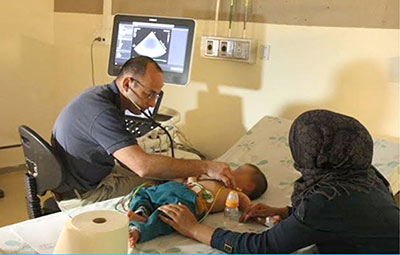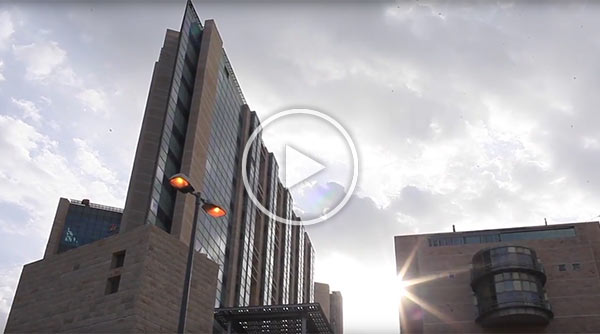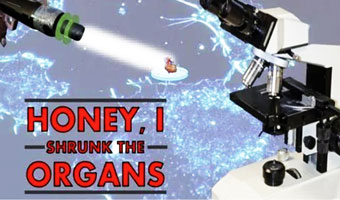
Healing Syrian Hearts: An Update 6/27/2018
Approval Issue Overcome in Fixing the Heart of a Syrian Infant at Hadassah
"We can help your daughter," Hadassah Medical Organization Senior Pediatric Cardiologist Dr. Julius Golender told the woman who was lovingly holding the baby with a hole in the wall of her heart.
The "mom" didn't correct him, but as it turned out, she was the child’s aunt—not the mother. Although this aunt had raised the baby as her own, the circumstance created a complication: the aunt did not have the authority to sign the permission forms for the surgery.
Everything had to stop, but Hadassah’s surgical team was not about to give up because of this obstacle. An Arabic-speaking Israel Defense Forces soldier was dispatched to Syria to bring the father to Israel so he could approve the surgery. After Hadassah’s doctors explained the procedure to him via Skype, he signed the forms. The surgery went forward and proved successful!
When the baby’s birth mother and father decided to divorce, the mother had left the baby with the father, who moved in with his brother’s family. At the time, the brother’s wife--the aunt--was five months pregnant with her fifth child. "Everyone here knows that the Israelis do the complicated surgeries we don't have in Syria,” relates the aunt. “I wanted to save this poor baby who saw me as her mom.”
Thanks to Dr. Eldad Erez, Hadassah’s pediatric cardiothoracic surgeon, the aunt’s dream came to fruition. The baby’s heart abnormality, ventricular septal defect (VSD), had been fixed. "I can already see a huge difference," said the aunt. The baby was already sitting up and smiling.
Repairing the Hearts of Syrian Children at Hadassah Hospital in Jerusalem. 6/22/2018
Layal, now 2, the fourth of Reem’s children, wasn’t growing like her siblings. There was something different also about her energy level. Although Reem, an outgoing homemaker knew that every child was different, she made an appointment with the doctor for her baby in her village health care center. She knew there was a problem when the doctor held the stethoscope to Layal’s chest for so long. Kalb he said in Arabic. “It’s her heart.”
Little Layal had a congenital heart defect, “a hole in her heart” which would have likely been diagnosed in a prenatal ultrasound in a Western country. Perhaps it would have been found in Syria, too, under normal circumstances. According to statistics from the Syrian Ministry of Health, Syria was on an upswing of medical care before the current crisis and the decimation of the health care system. What was clear was no way Layils heart could be repaired in Syria.
This “hole in the heart” was an Atrial Septal Defect (ASD), an abnormal opening in the wall between the upper chambers of the heart (the atria). If left untreated, this condition would produce excess flow to the lungs causing irreversible lung damage, dilate her heart and probably shorten her life.
Reem was married at 15 to a local farmer who raises tomatoes and cucumbers. She has been through tough years and a civil war, but the thought of her pretty baby’s heart working so hard and not being able to pump her blood was more than she could bear. She felt as if her world went dark.
Then Reem heard from word of mouth among Syrian moms that there was hope right across the border from her village. Since June 2016, the Israel Defense Forces has quietly been offering health care to Syrians across the border. Help was initially for those wounded in the war, but was later expanded to include advanced life-saving medical care available in Israel.
Layal was among the twenty children referred to a pediatric heart clinic at the Baruch Padeh Medical Center of Poriya Hospital in Tiberias. The Northern Israeli hospital partnered with experts in Hadassah Hospital in Jerusalem to examine the first twenty of some forty children close to the border identified with heart problems. Dr. Julius Golender, a senior pediatric cardiologist at Hadassah’s Ein Kerem campus, traveled to Tiberias and examined the patients.
“We can help your daughter,” he told Reem.
Tears welled in her eyes when the translator said those words in Arabic.
Please also see http://hadassahinternational.org/hadassah-cardiac-specialists-collaborating-colleagues-save-syrian-children/
Several Syrian children with heart problems like Layal have arrived at Hadassah this week, and are being treated successfully.
(The names of the patients and their mothers in this story have been changed to protect them).
See the children and their mothers cross the Israel-Syrian border to be treated at Hadassah Hospital.










